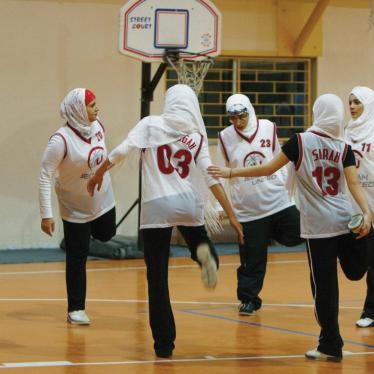(New York) – Saudi Arabia‘s National Olympic Committee’s decision to send two women athletes to the London Olympic Games is a breakthrough for Saudi women’s sports. However, there are still no signs of any advance in ending an effective ban on women and girls practicing sports inside the kingdom.
The two athletes are Wujdan Shahrkhani, in judo, and Sarah ‘Attar, in track and field.
“Allowing women to compete under the Saudi flag in the London Games will set an important precedent,” said Christoph Wilcke, senior Middle East researcher at Human Rights Watch. “But without policy changes to allow women and girls to play sports and compete within the kingdom, little can change for millions of women and girls deprived of sporting opportunities.”
Human Rights Watch said there are very recent instances of Saudi officials declining to approve women’s sporting initiatives. On July 3, 2012, a newly established Saudi journal, She and He Sports, wrote to the sports minister and Olympic committee chairman, Prince Nawwaf bin Faisal, to ask for the ministry’s approval to hold a women’s sports tournament during Ramadan in Jeddah.
The journal’s general manager, Ahmad Marzuqi, and its editor-in-chief, Hana’ al-’Uluni, wrote that they planned to hold women’s basketball, volleyball, and football (soccer) tournaments, “complying with Sharia requirements and national laws, such as non-mixing of genders, [obtaining] guardians’ approval, and compliance with modest dress.” Two days later, however, a person working at the journal told Human Rights Watch that an official of the sports ministry informed them by telephone that the ministry would not approve this effort, requiring them to cancel their plans.
The person working at She and He Sports went on to say that there are dozens of Saudi women and girls anxious to play sports, but that the lack of official support made practicing sports extremely difficult. “We don’t care too much about the Olympics; we care about allowing women to play at home,” the person said.
A Saudi woman who plays football in Riyadh told Human Rights Watch after today’s announcement that she was hopeful that Saudi women’s participation in the Olympic Games will open up sporting possibilities for women inside the kingdom.
She and He Sports features articles by a number of male and female Saudi supporters of women’s sports on its website, such as by Dr. Laila al-Ahdab, a physician and social worker, on July 3 affirming that “women have an Islamic legal right to practice swimming,” and Dr. Husna’ al-Qunai’ir, a prolific social critic, on June 19, challenging the Education Ministry for its prevarication on introducing physical education for girls in school, or Saudi film actress Marwa Muhammad on July 7, saying that “football is an entertaining sport suitable for both genders …and it has not and will not be a shame” for women to play.
In November 2011, however, Dr. Mohammad al-’Arifi, a popular Saudi cleric with over two million followers on Twitter, warned Prince Nawwaf about sending women to the Olympics, one day after the announcement that women could participate under certain conditions:
Women practicing sports … is fundamentally allowed … but if this leads to mixing with men … or revealing private parts … or men watching her sometimes run, sometimes fall down … sometimes laugh and sometimes cry or quarrel with another female athlete … or mount a horse … or practice gymnastics … or wrestling … or other sports … while the cameras film and the [television] channels broadcast … then there can be no doubt that it is forbidden.
“Women’s sports have a long way to go in Saudi Arabia,” Wilcke said. “Female participation in the London Games will only have impact if it begins to level the playing field for women in the Kingdom. Now is the time for the International Olympic Committee to use its leverage and lay down concrete plans for female sports in girls' schools, women’s sports clubs, and competitive tournaments.”







